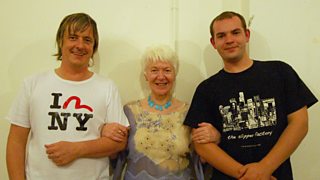'I would have killed him' — one woman's shocking experience of postnatal PTSD
Each year an estimated 30,000 women in the UK are diagnosed with postnatal PTSD and, as one woman discovered, the symptoms can be terrifying.
Gill Skene can remember the moment she lost control. She was arguing with her husband Mark over a trivial matter but as they bickered he stood between her and their sleeping baby daughter.
“It was primal,” recalls Gill on Brainwaves. “[It was] a confrontation and he is trying to take my baby; that is how I felt.
"And for just a split second I would have killed him.”

What causes postnatal PTSD?
Midwife Dr Jenny Patterson explains the common factors behind the condition.
This moment was the culmination of weeks of despair for Gill. Following the complicated and traumatic birth of her daughter, the fear of harm befalling her played on Gill's mind.

"Anything that could be a danger to my baby was catastrophised to the extreme," admits Gill.
"I would drive to the end of the road and quite often just turn around and come back because I’d have a visualisation of a lorry careering into the back of the us or somebody stealing her in Tesco."
In the aftermath of the argument with her husband, Gill sought help and was diagnosed with postnatal Post-Traumatic Stress Disorder (PTSD).
She is one of many sufferers, according to midwife Dr Jenny Patterson, who has studied PTSD follwoing childbirth.
"We know that around 40-45% of women going through childbirth can find that experience to be traumatic at that full definition," says Dr Patterson.
The delivery of Gill’s daughter was complicated, but how could this have led her – and other women with similar diagnoses - to develop PTSD?
The causes
Dr Patterson pinpoints some key factors which may influence the onset of postnatal PTSD. These include the objective event, which is what happened at the birth such as medical intervention or experience of pain; the subjective experience, which is how the woman perceived the birth; demographic factors; pre-existing traumas and pre-existing mental health conditions.
“What we now know is that the woman’s subjective perception is the most important one," adds Dr Patterson.
Gill’s tale has a happy ending. She undertook three years of Eye Movement Desensitisation and Reprocessing (EMDR) therapy. This is a method where over a period of time patients revisit the memory of an event in order for it to become less threatening.
"It’s kind of likening it to a big pile of rubbish in your mind," says Gill. "It’s put there but you can’t deal with it at the time because you have caring responsibilities. Having the right treatment just files away that rubbish into the spaces it’s supposed to go."
Information & Support: 91Èȱ¬ Action Line
On 91Èȱ¬ Sounds
-
![]()
Brainwaves
It might affect as many as 30,000 women in the UK each year but few of us know much about it. Pennie Latin investigates the shocking consequences of postnatal PTSD.
Latest features from 91Èȱ¬ Scotland
-
![]()
'Wild swimming helps me process the grief of losing my son'
The benefits of cold water therapy.
-
![]()
Winter adventures are appealing, but an expert advises caution
Trips in winter require particular knowledge and skills.
-
![]()
The rescuers: Why volunteers risk their lives in mountain emergencies
Landward meets members of the Cairngorm Mountain Rescue Team.
-
![]()
‘Look for the light’ – practical tips to help you through another winter with SAD
Useful advice and tips to combat low moods at this time of year.
-
![]()
How you could be a binge drinker without even knowing
Binge drinking is classed as fewer units than many people may realise.
-
![]()
How chocolate biscuits and drama classes helped one man leave prison behind
The healing power of creativity.
-
![]()
'When people believe in you, it’s life-changing'
Author Graeme Armstrong revisits the man who helped turn his life around.
-
![]()
The 'breath-taking' display of US birds swept on to British soil
Recent storms have brought rare birds to our shores.
-
![]()
Six things we learned about Alan Cumming on Take the Floor (Spoiler: includes accordions)
The actor spoke to Take the Floor's Gary Innes.
-
![]()
How street gangs trap young men in a dangerous cycle of violence
The almost inescapable pull of life in a gang.
-
![]()
Why stylist Gok Wan believes there's no such thing as bad fashion
The fashion expert says we should stop following rules and do what feels right.
-
![]()
Is sending a CV still the right way to apply for a job?
They've been central to job applications for years, but are they worth it?
















